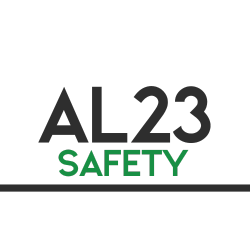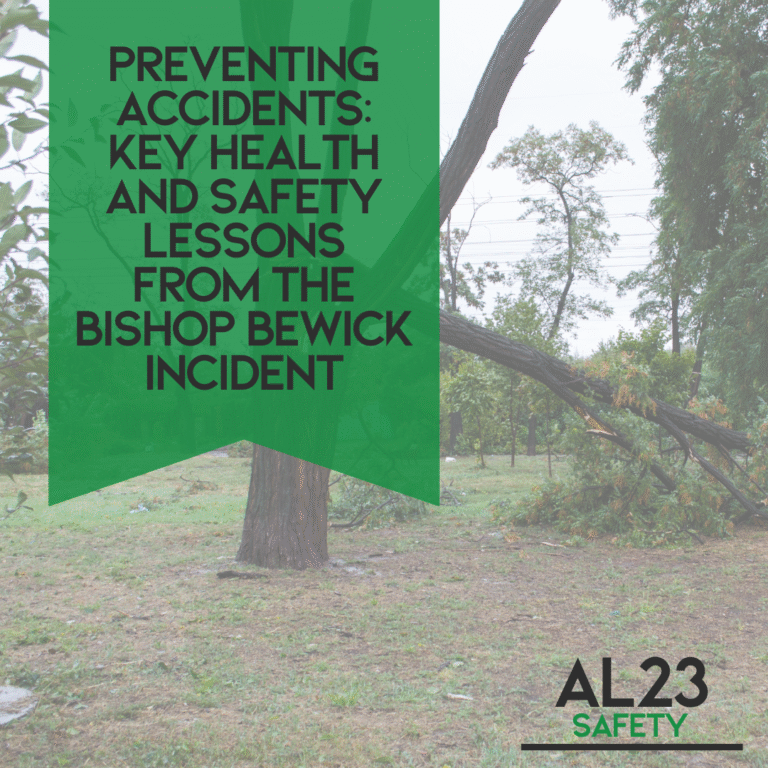The recent workplace safety incident involving Bishop Bewick Catholic Education Trust serves as a sobering reminder of what can happen when proper risk management systems aren’t implemented. A 68-year-old woman suffered critical injuries when a branch fell during untrained tree felling operations, highlighting the devastating consequences of inadequate risk management systems.
This incident provides invaluable lessons that every organisation must understand to develop effective risk management systems. At AL23 Safety, we’ve analysed this case to extract crucial insights that can help prevent similar tragedies through robust risk management systems implementation.
Understanding How Poor Risk Management Systems Led to the Bishop Bewick Incident
The Bishop Bewick incident demonstrates how quickly workplace situations can turn dangerous when comprehensive risk management aren’t in place. The severity of the injuries sustained underscores the critical importance of implementing proper risk management and ensuring adequate training before undertaking any potentially hazardous activities.
This case exemplifies why effective risk management must be at the forefront of every organisation’s priorities, regardless of industry or size. The legal, financial, and reputational consequences of inadequate risk management can be catastrophic for businesses.
Essential Risk Management Systems Lessons Every Organisation Must Learn
1. Proper Training Is Non-Negotiable
The most significant lesson from this incident is that effective risk management systems must include comprehensive training protocols. Untrained personnel should never undertake hazardous activities, and your risk management systems must clearly define competency requirements for all high-risk tasks.
Organisations must invest in proper certification programmes and ensure that only qualified individuals perform high-risk tasks. This includes understanding equipment operation, hazard identification, and emergency response procedures as part of your overall risk management.
2. Risk Assessment Must Be Thorough and Specific
Effective risk management require detailed assessments tailored to each specific activity. Generic risk assessments are insufficient when dealing with complex operations like tree felling, which involves multiple variables including weather conditions, equipment requirements, and proximity to people.
Every component of your risk management should begin with a comprehensive risk assessment that identifies potential hazards, evaluates their likelihood and severity, and implements appropriate control measures.
3. Contractor Management Systems Are Critical
Many workplace safety incidents occur when organisations fail to properly vet and manage contractors. Robust contractor management procedures must verify qualifications, insurance coverage, and safety track records before any work commences.
These workplace safety lessons extend to ongoing monitoring and supervision of contractor activities to ensure compliance with your organisation’s safety standards and legal requirements.
4. Clear Communication Channels Save Lives
Effective workplace accident prevention relies heavily on clear communication systems. All personnel must understand their roles, responsibilities, and the procedures to follow in case of emergencies.
Regular safety briefings, clear signage, and accessible reporting mechanisms are essential components of any comprehensive safety management system.
Implementing Robust Risk Management Systems
Developing Comprehensive Safety Policies
Your risk management should encompass every aspect of your operations, from routine maintenance tasks to complex projects. These policies must be living documents that evolve with your business and incorporate lessons learned from incidents like the Bishop Bewick case.
Regular policy reviews ensure that your workplace safety measures remain current with changing regulations and industry best practices.
Creating a Culture of Safety Awareness
True workplace accident prevention requires more than just policies and procedures – it demands a cultural shift where safety becomes everyone’s responsibility. This involves regular health and safety training sessions, safety committee meetings, and recognition programmes for good safety practices.
Leadership commitment is crucial in demonstrating that safety is a genuine priority, not just a compliance exercise.
The Legal and Financial Implications
The Bishop Bewick incident serves as a stark reminder that workplace safety failures can result in serious legal consequences. Organisations face potential prosecution under the Health and Safety at Work Act 1974, with penalties including substantial fines and even imprisonment for senior executives.
Beyond legal consequences, the financial impact of workplace accidents includes compensation claims, increased insurance premiums, lost productivity, and significant reputational damage that can affect future business opportunities.
How AL23 Safety Can Help Prevent Similar Incidents
At AL23 Safety, we specialise in helping organisations learn from workplace safety lessons like those highlighted in the Bishop Bewick case. Our comprehensive approach includes:
Risk Assessment Services: We conduct thorough, site-specific risk assessments that identify potential hazards and recommend practical control measures tailored to your operations.
Health and Safety Training: Our expert-led training programmes ensure your team has the knowledge and skills needed to work safely and respond effectively to emergencies.
Policy Development: We help organisations develop robust risk management that comply with current legislation and industry best practices.
Contractor Management Support: Our team can assist in establishing effective contractor vetting and management procedures to ensure all work is carried out safely.
Moving Forward: Creating Safer Workplaces
The workplace safety lessons from the Bishop Bewick incident must serve as a catalyst for positive change across all industries. Every organisation has a moral and legal duty to protect the health and safety of employees, contractors, and members of the public who may be affected by their activities.
Implementing comprehensive workplace accident prevention strategies requires commitment, resources, and expertise. However, the cost of prevention is always significantly less than the cost of dealing with a serious incident.
Regular review and continuous improvement of your risk management systems ensure that safety standards remain high and that lessons learned from incidents like this one are embedded into your organisational culture.
By taking proactive steps to address the workplace safety lessons highlighted by this incident, organisations can create safer working environments, protect their people, and safeguard their business interests.
For comprehensive support in developing and implementing effective workplace safety measures, contact AL23 Safety today. Our experienced consultants are ready to help you learn from these critical workplace safety lessons and create a safer future for your organisation.



